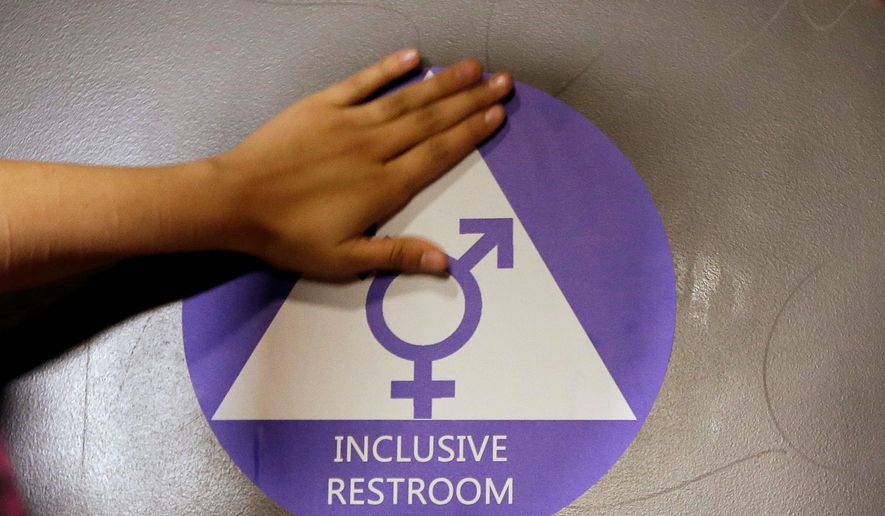Twelve state legislatures are considering bills that would require transgender people to use bathroom and locker room facilities based on their “biological sex” or birth gender, according to the National Conference of States Legislatures.
The tally provides an insight into how states might proceed now that President Trump has rescinded an Obama administration order that required schools across the country to allow transgender students to use whatever bathroom or locker room facilities they choose.
Matt Sharp, legal counsel for the Alliance Defending Freedom, said the repeal will inspire a flurry of legislative activity at the local level.
“I think it’s going to give states the motivation to start considering laws creating a baseline of privacy for all students,” Mr. Sharp said, “and really bring this issue back to where it belongs, which is in the states and local schools that know their students best.”
But Joshua Block, senior staff attorney for the American Civil Liberties Union’s LGBT Project, said the law still protects transgender students, regardless of the Trump administration’s interpretation of Title IX, a federal statute barring discrimination on the basis of “sex” in education.
He said the federal government has a responsibility to ensure that transgender people can use the bathrooms, locker rooms and shower facilities corresponding with their gender identity.
“Sex discrimination in public schools hasn’t been something left to the schools since 1972,” Mr. Block said Thursday on a press call, referring to the Education Amendments of 1972, of which Title IX is a part. “What we decided in 1972 is that the federal government is going to protect everyone, regardless of where they live, against sex discrimination.”
According to the National Conference of States Legislatures, lawmakers in 12 states — Alabama, Illinois, Kansas, Kentucky, Minnesota, Missouri, New York, South Carolina, Tennessee, Texas, Washington and Wyoming — are considering bills that would limit transgender people to facilities consistent with their birth gender.
Similar legislation introduced in South Dakota and Virginia has failed to pass, according to the conference.
Only North Carolina has enacted a “bathroom bill.”
One obstacle before the states is the U.S. Supreme Court, which has agreed to hear a case brought by transgender student Gavin Grimm, who sued the Gloucester County School Board in Virginia over the right to use the boys’ room.
In light of the Trump administration order, the highest court could send the case back to the 4th U.S. Circuit Court of Appeals, which relied heavily upon the Obama administration’s interpretation of Title IX in siding with the transgender student.
Mr. Block, lead counsel in the case, said he is confident that the Supreme Court will hear it.
“If anything, the confusion caused by this recent action by the Department of Justice and the Department of Education only underscores the need for the Supreme Court to bring some clarity here,” he said.
But the Gloucester County School Board said the Trump administration’s order emphasizes that the “restroom and locker room policy is legal under federal law.”
Even if the Supreme Court does send the case back to the 4th Circuit, Mr. Sharp said, the transgender movement will likely continue to advance its interests through litigation.
“I definitely think this issue is going to be percolating in courts for a while,” he said, “especially since we know the other side is going to keep pushing the idea that Title IX [refers to] gender identity rather than biological sex.”
Another obstacle to the states enacting bathroom bills is the prospect of drawing the ire of the gay rights movement and its corporate allies.
The Human Rights Campaign spearheaded a boycott in North Carolina in response to the bathroom law there, which cost the state an estimated $250 million in lost revenue.
The boycott prompted PayPal to cancel plans to build an office building, the National Basketball Association to relocate its 2017 All-Star Game to New Orleans and the NCAA to move several collegiate sports championships out of the state.
The National Football League said a proposed bathroom bill in Texas could jeopardize the state’s chance of hosting a Super Bowl.
In response, Texas Gov. Greg Abbott said the “NFL needs to concentrate on playing football and get the heck out of politics.”
“For some low-level NFL adviser to come out and say that they are going to micromanage and try to dictate to the state of Texas what types of policies we’re going to pass in our state, that’s unacceptable,” Mr. Abbott said in a statement last week. “We don’t care what the NFL thinks and certainly what their political policies are — because they are not a political arm of the state of Texas or the United States of America.”
The Obama administration ordered schools nationwide in May to permit restroom and locker room access on the basis of gender identity. Noncompliant schools risked losing millions of dollars in federal education funding.
The order was halted by a federal judge in August after 12 states sued the federal government challenging its interpretation of Title IX.
Speaking at the Conservative Political Action Conference on Thursday, Education Secretary Betsy DeVos said the purpose in repealing the order was to return decision-making authority in education to the local level.
“Let me just say that this issue was a very huge example of the Obama administration’s overreach, to suggest a one-size-fits-all, federal government, top-down approach to issues that are best dealt with and solved at a personal level and a local level,” she said.
• Dave Boyer contributed to this report.
• Bradford Richardson can be reached at brichardson@washingtontimes.com.




Please read our comment policy before commenting.